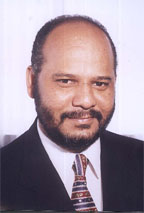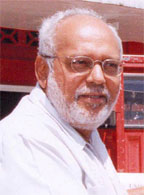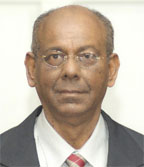Whoever wins the PPP’s presidential nomination for the 2011 general elections is widely believed to be the likely successor to Bharrat Jagdeo as President of Guyana
At this juncture it would probably be premature to lay claim to anything even remotely resembling a thorough analysis of the unfolding saga of who leads the PPP into the 2011 general elections. The drama of the emerging clutch of contenders for nomination as the party’s presidential candidate for the 2011 general elections still appears to have not yet completely unfolded. On the other hand, uninformed as so many of us are as to the process by which the PPP will decide who leads the party into the next general elections, the whole process of selection may already have been done and dusted for all we know.

Under different circumstances who emerges as the PPP’s candidate for next year’s general elections would have been far less of a national issue than it has turned out to be. The fact is, however, that whoever the PPP chooses as its presidential candidate is widely expected to succeed Bharrat Jagdo as Guyana’s President. At least the PPP faithful expects that that will be the case and those who seek the party’s nomination, in effect, aspire to the presidency. That makes it a matter of critical national importance even a year away from national elections.
The fact that the country’s eighth Executive President appears likely to be chosen by the leadership of the PPP rather than by the electorate is a discomfiting development in Guyanese politics the might easily delude the ruling party into thinking that it can walk on water. More to the point the current media and national preoccupation with who the PPP chooses as its next presidential candidate puts into perspective the weakness of the political opposition, particularly the PNC. Cynics might even argue that the current circumstances renders the 2011 general elections of no more than marginal importance.
Whether or not Bharrat Jagdeo really had any desire the serve a third term as President is now a tangential issue. The PPP would not have allowed it. The Party sees the presidency as a trophy to be passed on. Jagdeo’s time as President has come and almost gone; that, decidedly, is what the contenders for succession have been saying. This early, some of the contenders may be less forthcoming than others; but even they have their advocates and their letter-writers. Clement Rohee, the enigmatic Home Affairs Minister and long-serving party stalwart has been the most forthcoming of the contenders, asserting unambiguously that his time has come.

There is every indication that the battle for the presidential nomination could be a contentious one. The aspirants have all thrown down their respective gauntlets, preferring not to stand by sedately and wait and see whom the party anoints. The candidates for the PPP’s 2011 presidential candidature are not only lobbying the party’s Central Committee they are lobbying the entire nation.
It is the knowledge that there will be a contest of succession that creates a measure of interest on an otherwise enduringly doleful political landscape. Beginning with the Jagdeo ‘third term’ lobby of a few weeks ago the newspapers have published a succession of letters from writers who claim more than passing familiarity with the PPP’s engine room. The letters have promoted the contenders and parading their credentials and, in quite a few cases, even raising questions as to whether the whole process of choosing a presidential candidate is not in danger of being manipulated.
How much influence Jagdeo wield in the candidature issue? It is a relevant, perhaps even a central question. Apart from the fact that as sitting President his opinion on who follows him as presidential candidate could count for much, Jagdeo remains the power in the land for another year, perhaps more. He still has time to influence who serves as President after him.

Clement Rohee, for one, believes this. Aware as he is of a likely Jagdeo factor in the presidential candidature issue, Rohee, who has provided by far the most overt public signal of his interest in both the PPP nomination and the presidency of the country, has publicly acknowledged the incumbent Jagdeo’s “commendable example” as Head of State. “One of the biggest mistakes presidential hopefuls make is that they want to distance themselves from their predecessors to make themselves look different,” Rohee says.
It may be, perhaps that the man who is currently occupying his third ministerial portfolio since the PPP came to power in 1992 knows something that some of us might well not know. Accusations of corruption, nepotism and poor governance have dogged the Jagdeo administration and it may well be the Rohee’s deliberate endorsement of the Jagdeo presidency may be a reflection of the ebb and flow of the tide inside Freedom House.
This article does not seek to determine the extent of the worthiness of the respective contenders to lead the PPP into the next general elections. In his interview with The Guyana Times last Sunday Rohee certainly said more than a mouthful about the deserving nature of his own candidature given his experience both as a party ‘comrade’ and as Cabinet Minister since 1992. His point about “doctor politics” is well taken. Rohee may be no academic and though his tenure as Foreign Minister ended with the humiliation of Suriname’s 2000 gunboat diplomacy, he is experienced enough to know that occupying high political office in Guyana – in the Caribbean for that matter – is by no means rocket science.
The point that perhaps should be made about those who appear to be the leading contenders for the PPP’s presidential candidature is that all of them are part of the PPP old guard, part of its ideological ‘engine room.’ None can campaign persuasively on a platform that offers a different approach to governance, and an economic and political focus that hones in unerringly on such issues as reducing unemployment, improving the standard of education, cutting back corruption and beginning a process, hopefully, to a higher level of ethnic tolerance in a society where race relations have worsened considerably since the turn of the millennium. At least Jagdeo, given his youth and newness in 2001, could be ‘sold’ – as indeed he was – to the electorate as the face of change within the PPP. His lack of success in reducing racial tension is not an issue in question. But that matters little at this juncture. Jagdeo’s time has come and gone, and of those who aspire to follow him, none generates anything remotely resembling the level of anticipation which he evoked when he first ran for the presidency.
